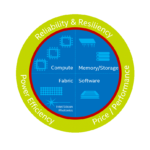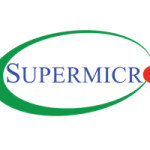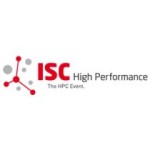Raj Hazra presented this talk at ISC 2016. “As part of the company’s launch of the Intel Xeon Phi processor, Hazra describes how how cognitive computing and HPC are going to work together. “Intel will introduce and showcase a range of new technologies helping to fuel the path to deeper insight and HPC’s next frontier. Among this year’s new products is the Intel Xeon Phi processor. Intel’s first bootable host processor is specifically designed for highly parallel workloads. It is also the first to integrate both memory and fabric technologies. A bootable x86 CPU, the Intel Xeon Phi processor offers greater scalability and is capable of handling a wider variety of workloads and configurations than accelerator products.”
Podcast: Intel Scalable System Framework Moves HPC Forward at the System Level
In this Intel Chip Chat podcast, Alyson Klein and Charlie Wuischpard describe Intel’s investment to break down walls to HPC adoption and move innovation forward by thinking at a system level. “Charlie discusses the announcement of the Intel Xeon Phi processor, which is a foundational element of Intel Scalable System Framework (Intel SSF), as well as Intel Omni-Path Fabric. Charlie also explains that these enhancements will make supercomputing faster, more reliable, and increase efficient power consumption; Intel has achieved this by combining the capabilities of various technologies and optimizing ways for them to work together.”
Intel® Xeon Phi™ Processor—Highly Parallel Computing Engine for HPC
For decades, Intel has been enabling insight and discovery through its technologies and contributions to parallel computing and High Performance Computing (HPC). Central to the company’s most recent work in HPC is a new design philosophy for clusters and supercomputers called Intel® Scalable System Framework (Intel® SSF), an approach designed to enable sustained, balanced performance as the community pushes towards the Exascale era.
Faster Route to Insights with Hardware and Visualization Advances from Intel
An eye-popping visualization of two black holes colliding demonstrates 3D Adaptive Mesh Refinement volume rendering on next-generation Intel® Xeon Phi™ processors. “It simplifies things when you can run on a single processor and not have to offload the visualization work,” says Juha Jäykkä, system manager of the COSMOS supercomputer. Dr. Jäykkä holds a doctorate in theoretical physics and also serves as a scientific consultant to the system’s users. “Programming is easier. The Intel Xeon Phi processor architecture is the next step for getting more performance and more power efficiency, and it is refreshingly convenient to use.”
Video: Rolling Out the New Intel Xeon Phi Processor at ISC 2016
In this video from ISC 2016, Barry Davis from Intel describes the company’s brand new Intel Xeon Phi Processor and how it fits into the Intel Scalable System Framework. “Eliminate node bottlenecks, simplify your code modernization and build on a power-efficient architecture with the Intel Xeon Phi™ processor, a foundational element of Intel Scalable System Framework. The bootable host processor offers an integrated architecture for powerful, highly parallel performance that will pave your path to deeper insight, innovation and impact for today’s most-demanding High Performance Computing applications, including Machine Learning. Supported by a comprehensive technology roadmap and robust ecosystem, the Intel Xeon Phi processor is a future-ready solution that maximizes your return on investment by using open standards code that are flexible, portable and reusable.”
Video: Announcing Intel HPC Orchestrator
In this video from ISC 2016, Figen Ulgen from Intel describes the new Intel HPC Orchestrator. “Intel HPC Orchestrator simplifies the installation, management and ongoing maintenance of a high-performance computing system by reducing the amount of integration and validation effort required for the HPC system software stack. Intel HPC Orchestrator can help accelerate your time to results and value in your HPC initiatives. With Intel HPC Orchestrator, based on the OpenHPC system software stack, you can take advantage of the innovation driven by the open source community – while also getting peace of mind from Intel support across the stack.”
Supermicro Launches Wide Range of HPC Solutions at ISC 2016
SuperMicro is showcasing its High Performance Computing solutions at ISC 2016 this week in Frankfurt, Germany. “With Supermicro HPC solutions deep learning, engineering, and scientific fields can scale out compute clusters to accelerate their most demanding workloads and achieve fastest time-to-results with maximum performance per watt, per square foot, and per dollar,” said Charles Liang, President and CEO of Supermicro. “With our latest innovations incorporating Intel Xeon Phi processors in a performance and density optimized Twin architecture, 8-socket scalable servers, 100Gbps OPA switch for high bandwidth connectivity, and high-performance NVMe for Lustre based storage, our customers can accelerate their applications and innovations to address the most complex real world problems.”
See What’s New from Intel at ISC 2016
New HPC products and technologies. Compelling demos. Insights from top Intel HPC architects. More than 60 presentations from Intel and industry experts. Additional details about Intel® Scalable System Framework. Intel will have something for everyone at this year’s International Supercomputing Conference in Frankfurt, Germany.
Disruptive Opportunities and a Path to Exascale: A Conversation with HPC Visionary Alan Gara of Intel
“We want to encourage and support that collaborative behavior in whatever way we can, because there are a multitude of problems in government agencies and commercial entities that seem to have high performance computing solutions. Think of bringing together the tremendous computational expertise you find from the DOE labs with the problems that someone like the National Institutes of Health is trying to solve. You couple those two together and you really can create something amazing that will affect all our lives. We want to broaden their exposure to the possibilities of HPC and help that along. It’s important, and it will allow all of us in HPC to more broadly impact the world with the large systems as well as the more moderate-scale systems.”
High-Performance Lustre* Storage Solution Helps Enable the Intel® Scalable System Framework
“Intel has incorporated Intel Solutions for Lustre Software as part of the Intel SSF because it provides the performance to move data and minimize storage bottlenecks. Lustre is also open source based, and already enjoys a wide foundation of deployments in research around the world, while gaining significant traction in enterprise HPC. Intel’s version of Lustre delivers a high-performance storage solution in the Intel SSF that next-generation HPC needs to move toward the era of Exascale.”













